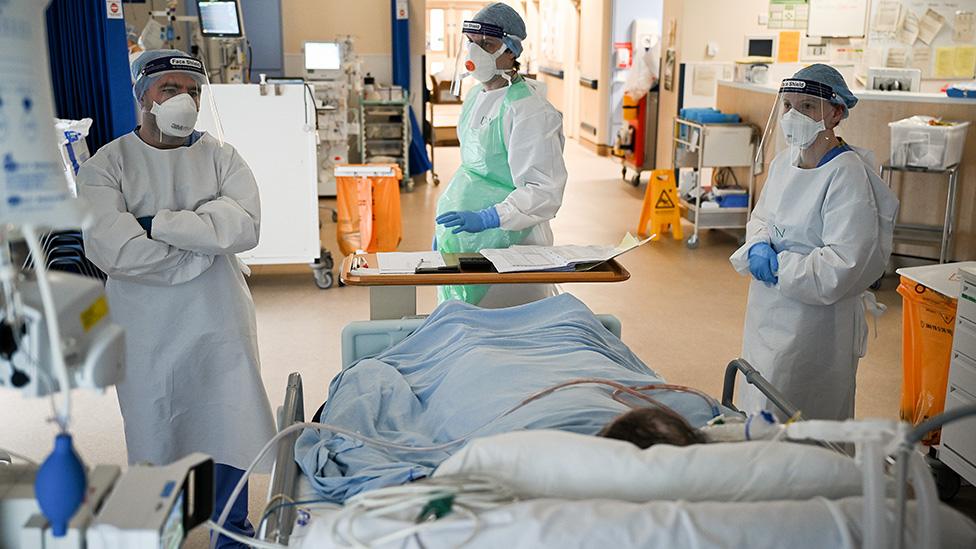Covid: How is the case rise affecting patient levels in worst-hit areas?
- Published

Covid patient numbers are beginning to rise again across many areas of Scotland
Covid cases are rising rapidly in Scotland, with eight council areas now above the Scottish government's level four threshold.
The number of Covid patients in Scottish hospitals is also increasing - particularly in the worst-hit health boards.
There are early indications the vaccination programme may have reduced the number of people needing hospital treatment, but public health experts say the dominance of the Delta strain is causing a "complicated" picture to emerge.
What do we know about hospital admissions in the health boards most affected by the recent rise in cases?
Scotland's Covid 'hot spots'
As of 11 June, Dundee had the highest Covid case rate in Scotland, recording almost 295 weekly cases per 100,000 people - a rate not seen in the area since January when Scotland was in full lockdown.
South Ayrshire, Edinburgh, Midlothian, Clackmannanshire, Glasgow, Perth and Kinross and Angus all have rates of more than 150 cases per 100,000, the threshold for level three.
In fact, only 10 Scottish councils would currently qualify to be in level two or lower, going by case rates alone.

Case rates are a crucial measure for the Scottish government when determining which level a local authority should be placed in - but they're not the only indicator.
Other figures include the percentage of positive cases and projected demand on local NHS services, external.
Prof Aziz Sheikh, director of Edinburgh's Usher Institute which examines population health, said the increases were being driven by the Delta variant which had taken hold "very rapidly" in Scotland.
The professor told BBC Scotland's Good Morning Scotland programme that the strain, first detected in India, now accounted for three-quarters of cases here.
What's happening to hospital numbers in the worst-hit health boards?
In Scotland's largest health board - NHS Greater Glasgow and Clyde (NHSGGC) - cases have been rising steadily for about six weeks.
The number being treated in the region's hospitals has also risen, but there are indications the figure could be stabilising at a much lower level than we saw in the autumn.
This chart shows the relationship between confirmed Covid cases in NHSGGC and the daily figure published on the number of Covid patients being treated.

Patient numbers do not seem to be rising as fast as they were in the autumn, but it's important to note that there is always a delay of a few weeks between a rise in cases and an increase in hospital admissions.
Cases have also been going up very quickly in NHS Tayside, driven by outbreaks in Dundee, Perth and Kinross and Angus.
The really steep rise only began two weeks ago, so it's difficult to determine now the impact this will have on Covid hospital admissions.

Different patterns are emerging in the other two health boards experiencing a fast rise in Covid cases.
In NHS Lothian, patient numbers have been fluctuating around a similar level over the last few weeks, whereas in NHS Ayrshire and Arran there has been a recent rise in patient numbers - but the figure may now be stabilising.


It's clear from all the health boards, that a proportion of people who get sick from Covid still need to go to hospital.
But Prof Sheikh, who also sits on the Scottish government's Covid Advisory Group, said the numbers appeared lower so far.
"We're already seeing increasing number of hospitalisations across Scotland. [It's] nothing like the kind of previous peaks that we've seen yet, but there is a lag at typically between infections and people contracting symptoms and ending up in hospital. So we need to watch this very carefully over the coming weeks," he said.
Why are patient numbers important?
First Minister Nicola Sturgeon is due to give an update later on the Covid levels system, but so far the Scottish government has appeared reluctant to place local authorities back into level three or level four restrictions, despite cases soaring.
One of the reasons for this could be that the government believes the link between cases and hospitalisation is weakening.
Ministers say this is happening because of the success of the vaccination programme, with more than half of all adults in Scotland now fully vaccinated with both doses.
This means that although large numbers are still being infected, a much lower percentage will end up in hospital, need an intensive care bed or die.
If this link has indeed weakened, then ministers may decide that higher case numbers do not need the stringent restrictions seen in spring 2020 or this winter.
But Prof Sheikh warned that some studies had shown that being infected by the Delta variant could increase the risk of hospitalisation.
"What's concerning is that there has been data published previously which shows that [the strain] is more infectious and our data is now showing that those who contract the Delta variant are at twice the risk of hospital admission, so I think there are some serious concerns here," he said.

The professor told BBC Scotland he welcomed Boris Johnson's decision to delay the final easing of lockdown restrictions in England because of concerns over the Delta variant.
The UK prime minister announced on Monday that the unlocking planned for 21 June would now be delayed by four weeks.
However, Prof Sheikh said the vaccines were still proving "very effective", especially in those who had received both doses.
"Overall, the vaccine programme is working and we are already seeing reductions in hospitalisations," he said.
"The Delta variant has made things a bit more complicated, but I'm confident that if we can press on at pace then hopefully we should be able to ease the restrictions that we're all living under."

